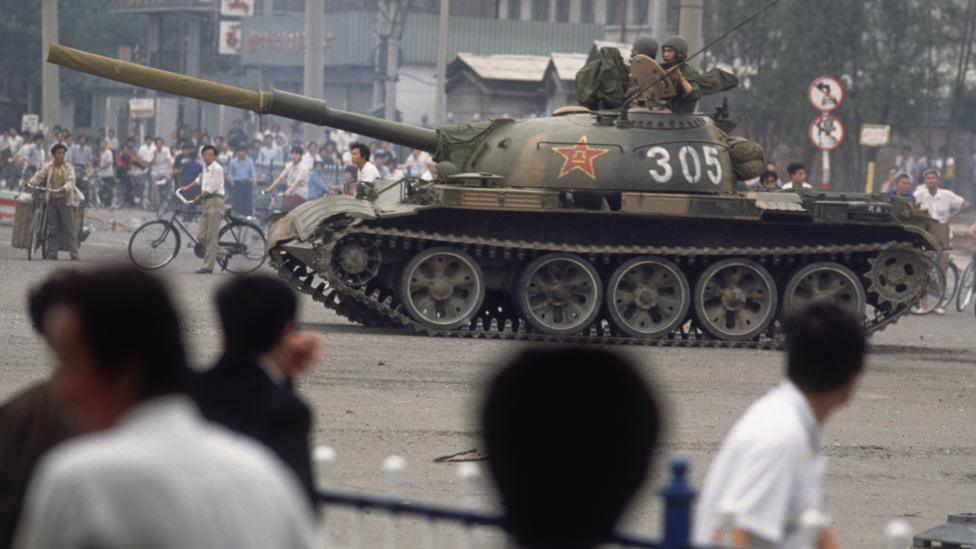Li Peng: Former Chinese premier known as 'Butcher of Beijing' dies at 90
- Published
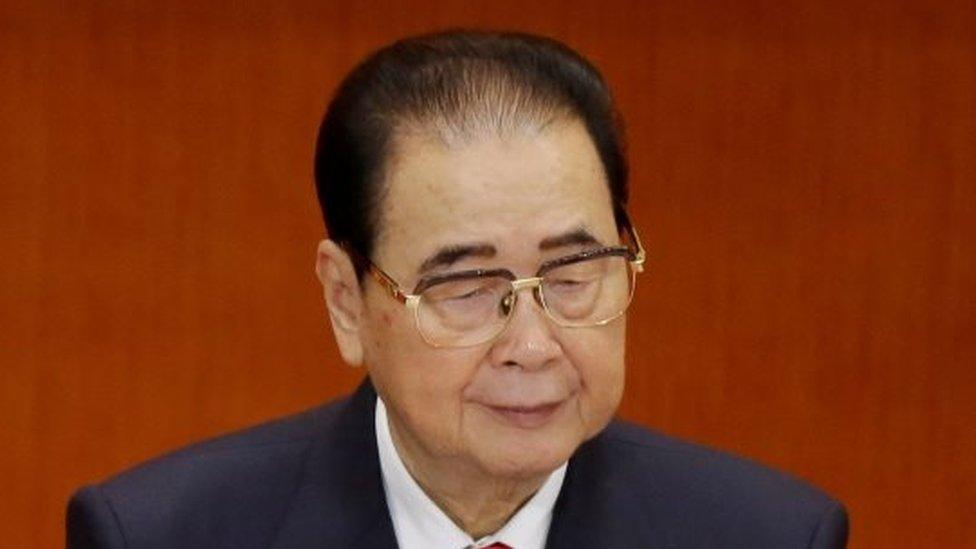
Li Peng, was known as the "Butcher of Beijing" for his role in the Tiananmen crackdown
Former Chinese Premier Li Peng, who ordered martial law during the 1989 Tiananmen protests, has died at the age of 90, state media have announced.
Li died on Monday evening in Beijing of an unspecified illness.
He served in several top positions in China in the 1980s and 1990s.
But he was best known as the "Butcher of Beijing" for his role in the Tiananmen Square crackdown on pro-democracy protesters in 1989. Soldiers killed hundreds of unarmed civilians.
Li later defended his actions as a "necessary" step.
In its obituary, the official Xinhua news agency says Li "took decisive measures to stop the unrest and quell counter-revolutionary violence" during the Tiananmen protests.
China has consistently censored the massacre for the last three decades, and avoids making reference to any atrocities that occurred during it.
Tiananmen's tank man: The image that China forgot
Wu'er Kaixi, one of the leaders of the protests, now living in exile, told the BBC he was glad Li Peng had died. Those who lost loved ones in June 1989 were still waiting for justice, he said.
"Li Peng was the butcher of the 4 June massacre, and that's how he should be remembered, by the world, and by history. Hopefully one day, by the text book of China."
What happened in 1989?
Pro-democracy protesters occupied Tiananmen Square in April 1989 and began the largest political demonstrations in communist China's history. They lasted six weeks.
On the night of 3 June tanks moved in and troops opened fire, killing and injuring many unarmed people in and around Tiananmen Square.
Afterwards the authorities said no-one had been shot dead in the square itself.
Wang Dan one of the leaders of the Tiananmen Square protests
China has never given an official figure for how many people died, but estimates begin in the hundreds. Rights groups and witnesses say the number of dead could run to several thousands.
What was Li's role?
Li is widely recognised as the principal architect behind the crackdown.
On 20 May 1989, he cemented this perception by appearing on national television to declare martial law over parts of Beijing. He did so as pressure for change reached fever pitch following weeks of student-led protests in the Chinese capital.
Two weeks later, the Chinese Communist Party - then headed by paramount leader Deng Xiaoping - made the collective decision to end the protest by sending tanks and troops to the square.
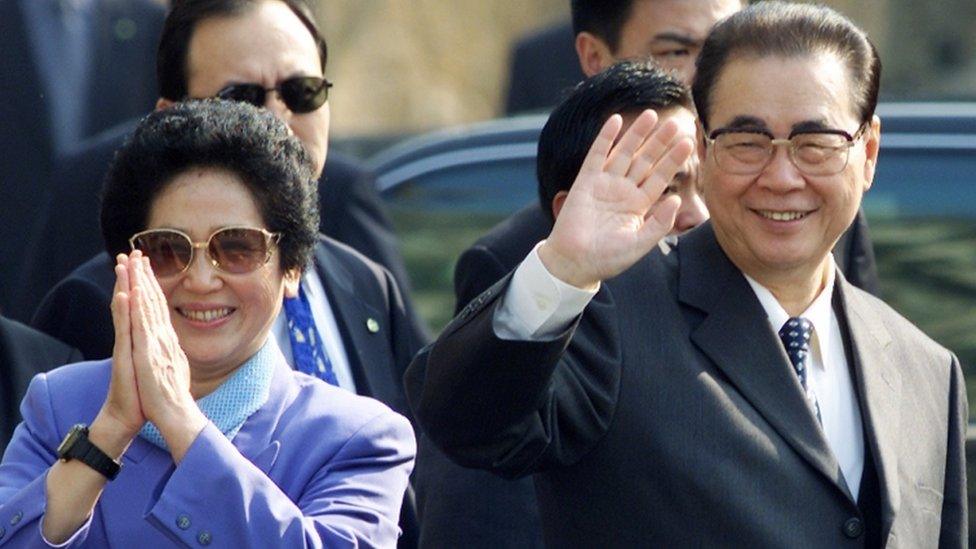
Li Peng and his wife Zhu Lin greet spectators as they tour Macau on 17 February 2002
The bloody crackdown that followed is widely blamed on Li, though other Communist Party leaders were said to be involved in making the decision.
In diary entries by Li - published in 2010, external - he attempted to play down his role in the massacre, claiming he was merely following Deng's orders.
In contrast, leaked Communist Party documents known as the "Tiananmen Papers" appear to suggest Li spearheaded the crackdown, encouraging Deng to go ahead with it.
In China, Li is better known for his role in modernising the country's economy, paving the way for its meteoric rise as a global superpower.
His image abroad, meanwhile, remains tarnished by the bloody episode of 1989. Over the years, his foreign appearances have attracted mass demonstrations, most notably in Paris in 1996, when thousands protested his visit.

'Communist Party loyalty, even in death'
Analysis by Celia Hatton, BBC News, Beijing
When he was still alive, Li tried to clear his name, arguing that his actions in 1989 were backed by Communist Party elders. In an essay published by China's state media, he said the top leader at the time, Deng Xiaoping, had given his "firm and full support to put down the political disturbance using forceful measures".
News of Li's death - and the inevitable attention it will attract to the events of 1989 - will surely not be welcomed by China's leaders. They are already struggling to deal with another round of student-led pro-democracy protests, this time in Hong Kong.
But the Communist Party's decision to repeat Li's defence of what happened in 1989 shows that it, too, will not revisit the official version of events.
Perhaps that's a comforting thought for the current Communist Party leaders: that whatever actions they take today will receive unrelenting party support, even in death.

How has his death been reported?
In a pre-prepared obituary published by Xinhua, Li was hailed as an "an outstanding member of the Communist Party of China... loyal Communist warrior, outstanding proletarian revolutionary and politician".
The press agency praised him for building a "clean and honest government," adding: "Comrade Li Peng is immortal."
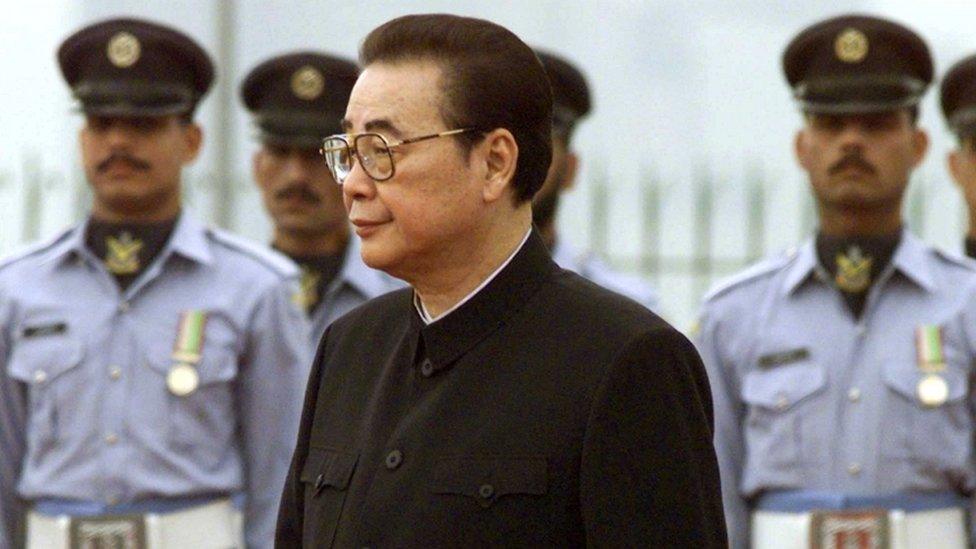
Li Peng had tried to clear his name over Tiananmen over the years
CCTV, a state-broadcaster in mainland China, aired a black and white picture of Li with the caption "Comrade Li Peng has passed".
However Hong Kong's South China Morning Post, which is not state controlled, said he would be "remembered for his controversial role in Beijing's bloody crackdown on student-led protests in Tiananmen Square in 1989".
Meanwhile on Chinese social media website Weibo, users were allowed to pay their respects to Li, whose name was not subject to censorship.
The names of senior Communist Party officials are typically censored on the Weibo.
The hashtag #ComradeLiPengHasPassed and candle emojis - traditionally used as a mark of respect - are being used on the platform.
Who is Li Peng?
Born in 1928 in the province of Sichuan, Li was the son of a communist revolutionary who was killed by the Kuomintang, the Chinese Nationalist Party, in 1931.
Orphaned as a child, Li was adopted by Zhou Enlai, the first Premier of the People's Republic of China, and his wife, Deng Yingchao, at the age of three.
In his teens, Li joined the Communist Party and moved to Moscow, where he trained become a hydropower engineer.
Upon his return to China, he worked at a state power company but, thanks to his family links, managed to avoid the political turmoil of the Cultural Revolution (1966-76).
Li's political rise came during Mr Deng's leadership from the 1970s, holding posts such as energy minister before becoming premier himself in 1987.
He held the premiership for 11 years until 1998 and remained a member of the elite Politburo Standing Committee - China's top decision making body - for 15 years.
- Published4 June 2019
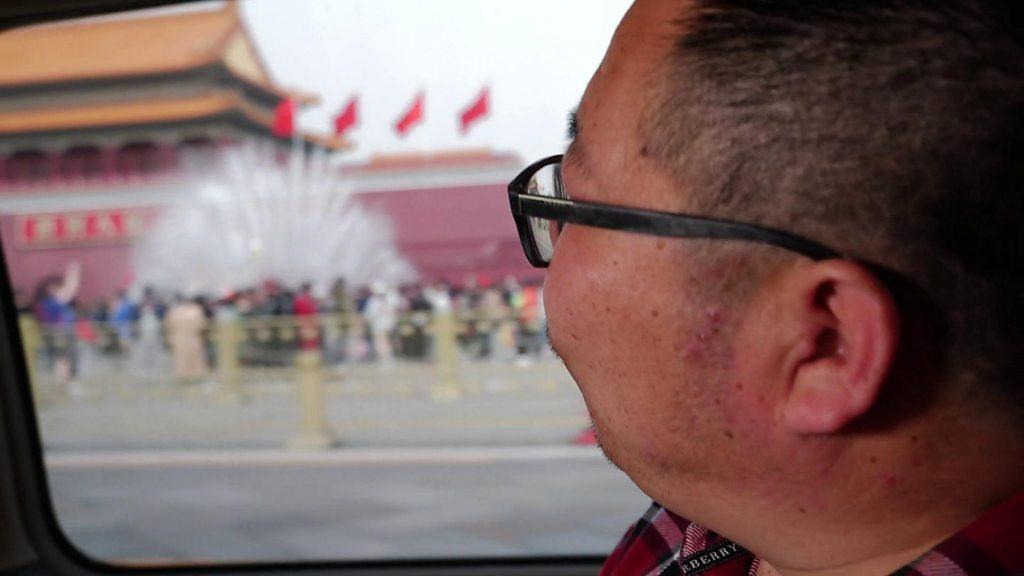
- Published4 June 2019
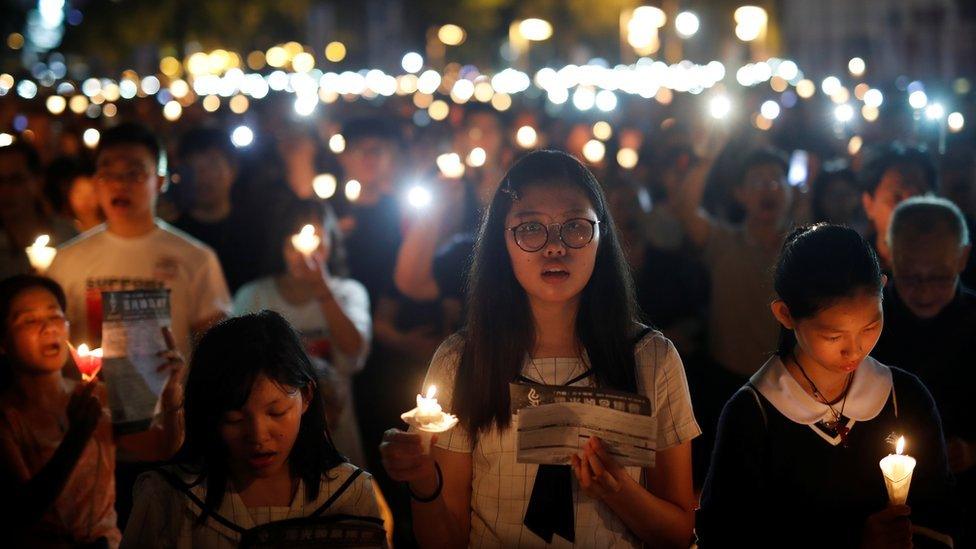
- Published23 December 2021
